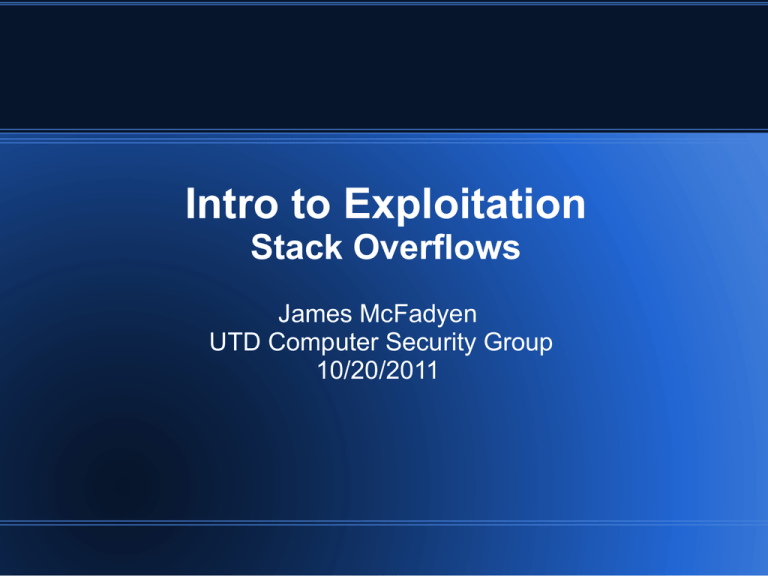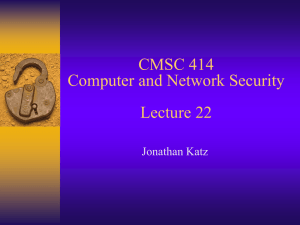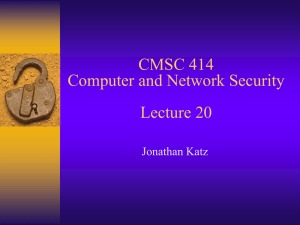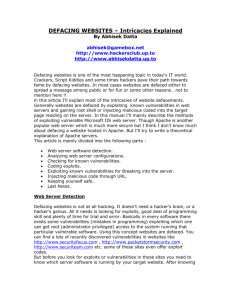Stack Overflow
advertisement

Intro to Exploitation
Stack Overflows
James McFadyen
UTD Computer Security Group
10/20/2011
Intro to Exploitation
Only an intro to stack overflow
Basic theory and application
One of many types of exploitation
Outline
What is a buffer overflow?
Tools
Vulnerable C Functions
Remember the memory
Learn to love assembly
Stack overflow
Protection Mechanisms
ret2libc in Linux
Buffer Overflow
“In computer security and programming, a
buffer overflow, or buffer overrun, is an
anomaly where a program, while writing data
to a buffer, overruns the buffer's boundary
and overwrites adjacent memory. This is a
special case of violation of memory safety.” Wikipedia
Buffer Overflow
In our examples..
Give the program too much input, hijack the
instruction pointer (EIP)
Control EIP
Execute arbitrary code locally or remotely
Achieve what we want as elevated user
Tools
Linux
GDB, gcc, vi, perl/python/ruby, readelf,
objdump, ltrace, strace, ropeme
Windows
WinDBG, OllyDBG, ImmunityDBG, IDA,
Python, Mona (ImmunityDBG plugin)
Vulnerable C Code
strcpy(), strncpy()
strcat(), strncat()
sprintf(), snprintf()
gets()
sscanf()
Many others...
Vulnerable C Code
strcpy() doesn't check size
If we have
char buf[128];
strcpy(buf, userSuppliedString);
This makes it too easy...
Vulnerable C Code
char *strncpy(char *dest, const char *src, size_t n);
We have a size, but what if..
strncpy(somebuffer, str, strlen(str));
or..
strncpy(somebuffer, str, sizeof(somebuffer));
Where str is supplied by user
Vulnerable C Code
Common bug, proper fix:
strncpy(somebuffer, str, sizeof(somebuffer)-1);
Vulnerable C Code
char *strncat(char *dest, const char *src, size_t n);
Ex:
int vulnerable(char *str1, char *str2)
{
char buf[256];
strncpy(buf, str1, 100);
strncat(buf, str2, sizeof(buf)-1);
return;
}
Vulnerable C Code
Fix: strncat(buf, str2, sizeof(buf) - strlen(buf) -1);
Remember the Memory
Low
Text
Data
BSS
Heap
Stack
High
Code segment, machine instr.
Initialized global and static
variables
Uninitialized global and static
variables
Dynamic space.
malloc(...) / free(...)
new(...) / ~
Program scratch space.
Local variables, pass
arguments, etc..
* Taken from Mitchell Adair's “Stack Overflows”
Remember the Memory:
The Stack
Low
ESP
local variables
...
EBP
EBP - x
EBP
RET
arguments...
previous stack frame
EBP + x
High
* Taken from Mitchell Adair's “Stack Overflows”
Love the Assembly
EIP – Extended Instruction
Pointer
ESP – Extended Stack Pointer
EBP – Extended Base Pointer
Next Instruction executed
Top of stack
Base Pointer
EAX
Accumulator register
EBX
Base register
ECX
Counter register
EDX
Data register
ESI
Source index
EDI
Destination Index
* Taken from Mitchell Adair's “Stack Overflows”
Stack Overflow
ESP
char buf[100]
100 bytes
EBP
EBP
RET
4 bytes
4 bytes
argc
*argv[]
* Taken from Mitchell Adair's “Stack Overflows”
Stack Overflow
ESP
Ex: $ ./program $(python -c 'print "A" * 108 ')
108 bytes
( 0x41 * 108)
Ret will pop the instruction pointer
off of the stack
EIP will now point to 0x41414141
100 bytes
EBP
RET
EBP
RET overwritten
RET
argc
*argv[]
4 bytes
4 bytes
* Taken from Mitchell Adair's “Stack Overflows”
Stack Overflow
Ex: $ ./program $(python -c 'print "A" * 104 + “\xef\xbe\xad\xde” ')
ESP
104 bytes
( 0x41 * 104
EIP will now point to 0xdeadbeef
We can now point EIP where we want
100 bytes
EBP
RET
EBP
0xdeadbeef
RET
4 bytes
4 bytes
argc
*argv[]
* Taken from Mitchell Adair's “Stack Overflows”
Stack Overflow
$ ./program $(python -c 'print "A" * 104 + “\xef\xbe\xad\xde”
')
We have 104 bytes for a payload
Payload can be anything, but for our purpose
we would spawn a shell
The payload will be fixed size, so when we
insert it, we must reduce the # of A's by the
size of the payload
Stack Overflow
$ ./program $(python -c 'print "A" * 104 + “\xef\xbe\xad\xde”
')
If we had a 32 byte payload .. (real payload will not
be a bunch of \xff)
$ ./program $(python -c 'print "A" * 72 +
“\xff\xff\xff\xff\xff\xff\xff\xff\xff\xff\xff\xff\xff\xff\xff\xff\xff\xff\x
ff\xff\xff\xff\xff\xff\xff\xff\xff\xff\xff\xff\xff\xff” +
“\xef\xbe\xad\xde” ')
We have adjusted the buffer so the payload will fit
We will then have to point EIP (\xef\xbe\xad\xde) to our
payload on the stack
Stack Overflow
$ ./program $(python -c 'print "A" * 72 +
“\xff\xff\xff\xff\xff\xff\xff\xff\xff\xff\xff\xff\xff\xff\xff\xff\xff\xff\x
ff\xff\xff\xff\xff\xff\xff\xff\xff\xff\xff\xff\xff\xff” +
“\xef\xbe\xad\xde” ')
“\xef\xbe\xad\xde” would be replaced with the address
of our payload
EIP will now point to the address of our payload,
which will spawn a shell
NOPs help create a bigger “landing area”
This technique is not very effective anymore...
why?
Protection Mechanisms
(Windows)
DEP – Data execution Prevention
/GS Flag – cookie / canary
detects if stack has been altered
SafeSEH – Structured Exception Handler
Can't execute on the stack
Try / except, catches exceptions
ASLR - Address Space Layout
Randomization
Randomizes addresses in memory
Protection Mechanisms (Linux)
NX – Stack Execute Invalidation
Processor feature
Like DEP, can't execute on the stack
Stack Smashing Protection – cookie / canary
Generally enabled by default
ASLR - Address Space Layout
Randomization
Many other compiler protections...
ret2libc
Bypasses NX
Point EIP to a function in libc
system(), exec() etc...
system(“/bin/sh”);
We will get a shell by using the system()
function in libc
ret2libc
$ ./program $(python -c 'print "A" * 104 + “\xef\xbe\xad\xde”
')
We don't need the payload where the A's are
anymore
We now will point EIP to the address of
system(), then the next 4 bytes will be a
return address, followed by system()
arguments (which will be /bin/sh)
$ ./program $(python -c 'print "A" * 104 +
address_of_system + return_address + payload ')
Demo!
How to use GDB for exploitation
Exploring the stack
Finding important memory addresses
(ret2libc)
Breakpoints
Using Perl/Python/Ruby for arguments in GDB
Basic Stack Overflow
Ret2libc
Additional Resources
https://www.corelan.be/index.php/articles/
http://beej.us/guide/bggdb/
http://en.wikibooks.org/wiki/X86_Assembly
http://www.alexonlinux.com/how-debuggerworks
http://smashthestack.org/
http://intruded.net/
Sources
“Source Code Auditing” - Jared Demott
“Smashing the stack in 2010” - Andrea
Cugliari + Mariano Graziano
“Stack Overflows” - Mitchell Adair
http://en.wikipedia.org/wiki/Buffer_overflow
http://en.wikipedia.org/wiki/Return-tolibc_attack










